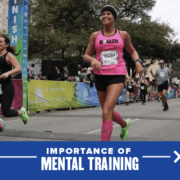The Importance of Mentally Training for a Half or Full Marathon
If you’re like most runners, you spend the majority of your time training your body to run long distances. But what about your mind? Despite being just as important as the body, mental training often falls by the wayside. In this post, our 2021-2022 Race Ambassador Jackie talks about the importance of mental training and shares some personal experiences to help you get started.
Lace up your sneakers and let’s get started!
Out of 47 races, I have never quit, until last weekend. Heck! I didn’t even start, let alone quit.

I trained for several months for my race. In prime physical condition, I felt very strong and confident in the distance and my ability to finish. But come race morning, I did not want to compete. I didn’t even want to try. I really didn’t want to participate at all. So, I didn’t. I quit, before the race even started. I failed mentally. Upon reflection and talking with other experienced runners and coaches, I realized I never mentally trained for the race.
Here are the mental training tips that I learned and want to share with you as you prepare for your Austin Marathon or Half Marathon.
1) First and foremost, listen to your body. Take a break when your body is telling you that it’s fighting extreme exhaustion or is injured. See a doctor or physical therapist if needed. These tips are for building your mental strength and are not suggested to be used in place of your physical needs.
2) On the flip side, don’t blow off your workouts because you are tired and just don’t feel like doing them that day. After doing this too many times, it becomes the norm. Stand true to your workouts and try to hit as many as possible. Tell yourself you are strong and can do it – then do it!
3) Embrace the suck. Some runs are hard, and they might suck. But without these, you won’t know what a good workout feels like. And these hard workouts make you stronger and faster, so embrace them.

4) Remember that racing is fun. Sure, we all have a little competitiveness and our own personal goals, but they should be fun. If you find yourself frustrated or regretting every workout in your training plan, maybe ask yourself if you are running the right distance.
5) Visualize your race day. Do this early and frequently in your training. Picture the hills, weather (good and bad), temperature, crowd support, etc. Walkthrough good and bad runs in your mind and decide early how you are going to handle each when or if they come.
6) Remember why you committed in the first place. Many times, this alone will carry you through any tough run.
7) Share your feelings with your running tribe. Fellow runners are your best supporters and can help you talk through your concerns. Even if you are one who likes to run alone, call your running friends or message them and just chat about your training and how you feel. These folks can help carry you through any bad workout or race. They will be there to get you to the start.
8) The power of positive thinking is real! Stay positive and don’t allow yourself to travel down the spiral of negativity. Stop and redirect your thoughts if you start down the negative path.
I hope you find help in these and best of luck with your training! You can follow Jackie on Instagram at @jaxbunce.






